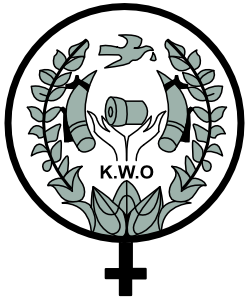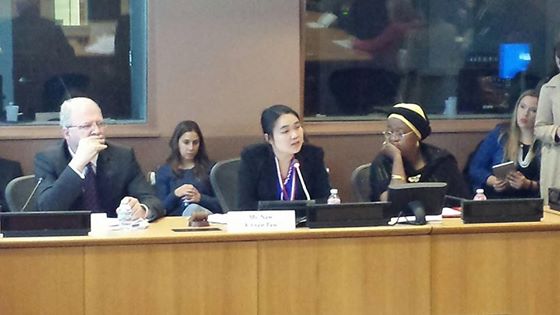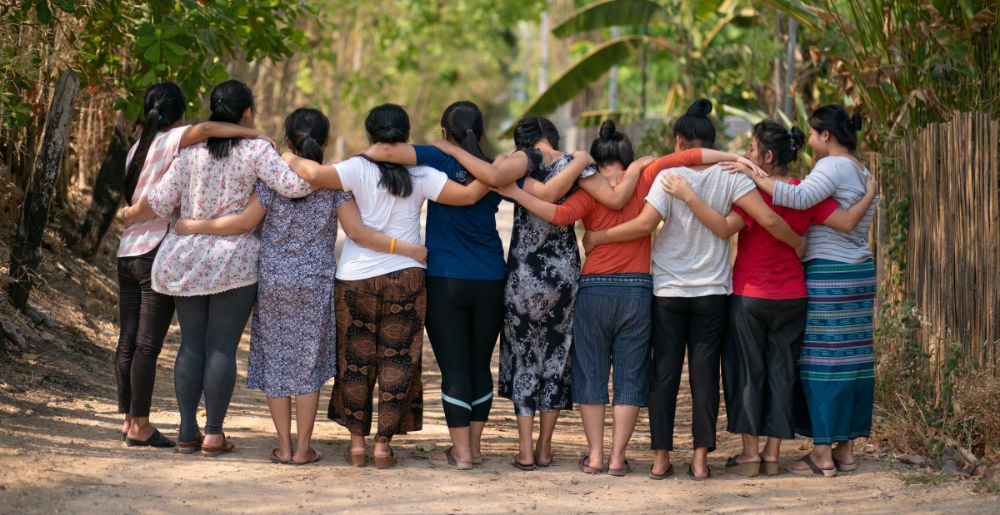Statement by Naw K’nyaw Paw
at the Side Event to the
Open Debate of the United Nations Security Council
on
Conflict-Related Sexual Violence
New York, April 24, 2014
Ms Naw K’nyaw Paw Nimrod, Secretary of the Karen Women’s Organization and Member of the Executive Committee of the Women’s League for Burma
Your Excellency Madame Zainab Bangura, UN Special Representative of the Secretary-General on Sexual Violence in Conflict,Your Excellency Ambassador David Donoghue, Permanent Representative of Ireland to the United Nations, Excellencies, Ladies and Gentlemen,
First, I would like to thank Ambassador Donoghue and the wonderful staff of the Permanent Mission of Ireland who made possible that I can be in New York today. I also want to thank the Special Representative on Sexual Violence in Conflict Zainab Bangura and her staff for their outstanding work on fighting sexual violence in conflict. Finally, I want to thank all the civil society organizations that helped organize and co-host this event. To all, what you have done at the United Nations, through your reports, resolutions and efforts to call attention to, and end, sexual violence against women in conflicts around the world has made a difference for us and for many others.
My name is Naw K’nyaw Paw and I am the Secretary of the Karen Women’s Organization. The Karen Women’s Organization is a community-based organisation with a membership of more than 49,000 Karen women. Together, we advocate for freedom, equality and empowerment and ending sexual violence along with working in development and relief in the Karen state and in refugee camps on the Thai-Burma border. We run safe houses for abused women, education programs for children, and empowerment programs for women.
I am a refugee from Burma. When I was 10 my family fled to the refugee camps in Thailand as the Burmese army began an air bombing campaign on our area. I have grown up exiled from my own land in fear of being forced back into bloodshed and destruction. That history has led me to work for my people.
Burma is home to 8 major ethnic groups along with numerous smaller groups, and for decades their struggle for freedom and equality against the Burmese military dictatorship has given rise to one of the longest running armed-conflicts in the world.
In the past few years, Burma has taken small steps towards establishing civilian government and democracy. Despite those fragile steps, conflict with ethnic groups continues to this day. While fighting has decreased in Karen State, where I am from, it has increased north of us in Kachin and Shan States. More than 100,000 civilians been displaced during this continuing conflict and women have been continued to be the direct victims of violence.
During this continued fighting, ethnic women and girls in Burma have been targets of sexual violence at the hands of the Burmese military. Since the civilian government took office in 2010, which signaled the start of reform in Burma, 104 cases of sexual violence perpetrated by Burma’s military have been documented by Women’s League of Burma and its member organizations, implicating over 38 different battalions. 47 cases were brutal gang rapes, several victims were as young as 8 years old and 28 of the women were either killed or died of their injuries. This is a deeply neglected issue which is too often covered under a veil of silence in Burma in order not to “threaten” any reform or progress.
There are many factors enabling these crimes, but in Burma there is one that I would like to highlight today: Burma’s current Constitution. The Constitution leaves victims of sexual violence with no means of achieving justice, redress or reparations for these crimes.
Decades of military dictatorship have instilled a culture of impunity within its ranks. This impunity was formalized in Burma’s current constitution, passed in 2008. The Constitution guarantees immunity to both the civilian government and the military for all of its actions, including crimes against humanity, grave breaches of the Geneva or Genocide Conventions and violations of Security Council Resolutions, including those mandating accountability for rape used as a weapon of war. Further, the Constitution establishes the military as an independent self-governing legal entity outside any civilian oversight because neither the executive, legislative or judiciary have any legal capacity to hold military forces accountable for their actions. Therefore, there can be no justice, redress and reparation for victims of sexual violence in Burma unless these constitutional provisions are amended.
The next few years will determine if Burma can succeed in this transition to democracy. The ongoing peace processes and ceasefire talks are essential to ethnic groups gaining reconciliation and justice for past crimes, and preventing new violence and killings. One thing is clear: Burma will not succeed in sustainable peace without its women.
Currently in Burma, women’s access to, and participation in, decision making bodies and structures ranges from limited to non-existent and there has been next to no inclusion of women at the peace negotiation table. This failure to include women directly contravenes the work that all of you have done to recognize the importance of women’s participation in conflict and post-conflict situations. Security Council resolutions, including 1325, have been tools for those of us working in Burma to demand our rightful place in the conversations about what the future of Burma will look like. But we cannot do this alone.
We call on the United Nations and donor states to ensure that we, women who bear the burden of war are at the peace table and that our voices are heard.
The Karen Women’s Organization has worked to educate and empower our members and others in the community. We formed a Peace Committee that advocates for the issues of importance to our members to be included in subsequent talks.
We have also worked in Karen State to educate women about the central matters at issue during the peace talks: federalism, the 2008 Constitution, human rights, democracy, and responsible governing. We believe by educating women they are more able to enter discussions in the community about the important issues that swirl around us.
I am pleased to see progress in Burma, but as you can see much remains to be done. Many refugees like me and internal displaced people who fled from home land due to military offensive have still no place to go back as many of our homes and villages have been burnt down. We also need continued funding for women’s organizations to support victims and document continued abuse. While international funding to Burma has recently increased, much of it has funded Rangoon-based organizations and is funneled through approved Burmese Government channels. This makes it harder for ethnic community based organizations, like the Karen Women’s Organization, to access the needed funding to support women and provide crucial services. We need your support to help these women.
We need your help in ending this conflict, because unless the conflict ends, women continue to suffer daily under the hands of military and refugees like me cannot go home.
We need your support in having Burma’s government acknowledge that until they bring the military under civilian control through constitutional changes, there can be no true democracy or rule of law in Burma.
We need you to continue to put pressure on Burma’s government to immediately end its use of sexual violence against girls and women and call for accountability for these crimes.
We welcome the Secretary-General’s recommendation to the Burmese government in his newest Report on Sexual Violence in Conflict “to fully investigate and respond to current and historical human rights violations and abuses including sexual violence crimes.” I am asking you specifically to call for an international investigation into the use of rape and sexual violence as a weapon of war in Burma. This is the demand of the Women’s League of Burma which is made up of women representing most major ethnic groups.
We need your support in ensuring that the women of Burma have not only a place, but a voice, at the peace table. Women in Burma have been working for decades for an end to conflict, an end to human rights abuses, including sexual violence against us, and to take our place in a peaceful, democratic Burma.
I thank you for your attention.



